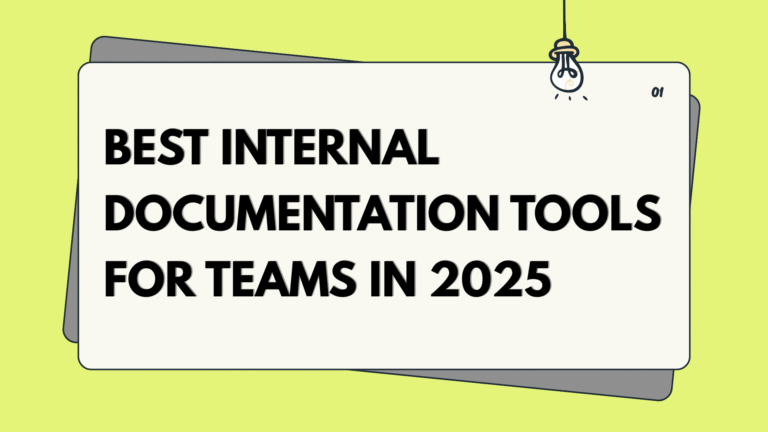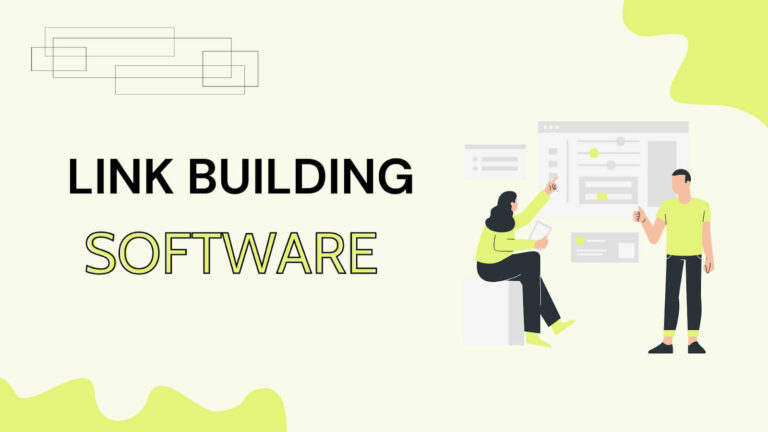AI searches are growing fast. According to a Semrush report, by March 2025, 13.14% of all queries showed an AIO (up from 6.49% in January). 88.1% of AI Overview triggers come from informational queries. We’ve rounded up the best platforms for AI search monitoring, so you can stay ahead.
1. Semrush
Semrush is leading the charge with an all-in-one platform that now includes AI Search Visibility tracking. It gives marketers the ability to see how often their brand shows up in AI Overviews, ChatGPT, Perplexity, and Gemini.
You can now monitor linked mentions, unlinked references, sentiment, and even competitor share of voice, all from the same dashboard you already use for SEO, PPC, and content marketing.
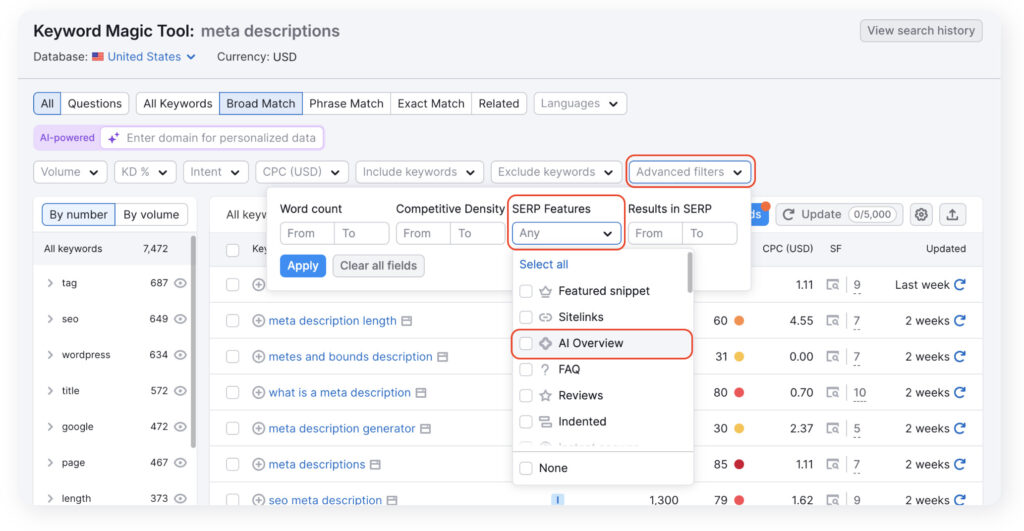
What I like
As someone already using Semrush for SEO, I really love its AI monitoring. The AI visibility data sits right next to backlink audits, keyword rankings, and content gap reports. It actually shows where and how your brand shows up across AI platforms.
You can see linked vs. unlinked mentions, sentiment analysis, and what competitors are doing better. Semrush even suggests actionable steps. For example, which prompts should you be optimizing for?
Particularly, its comprehensive AI Overview monitoring makes it easy to see if my site is included in an AI snippet, and the fact that it shows historical trends helps me understand how visibility changes over time. For me, the sheer size of Semrush’s keyword database and the depth of its research features make it always a top option for staying ahead in generative search.
What I dislike
The first drawback for me is the cost. It’s significantly more expensive than other tools.
The interface is overwhelming at times. There’s so much packed into the dashboard that it may take a while for you to get comfortable navigating it.
For one thing, the data is generally strong, but traffic estimates don’t always line up with what I see in Google Analytics. Using Semrush to its full potential requires both SEO experience and time. It’s a powerful tool, but definitely not the most beginner-friendly option.
2. Ahrefs
Ahrefs has always been well-known for SEO, but with its new Brand Radar feature, the platform has stepped into a new era.
Ahrefs now lets you see how your brand is mentioned inside AI-generated answers from platforms like ChatGPT, Google’s AI Overviews, and Gemini. This tool offers a direct way to measure brand presence, benchmark competitors, and spot AI visibility gaps.
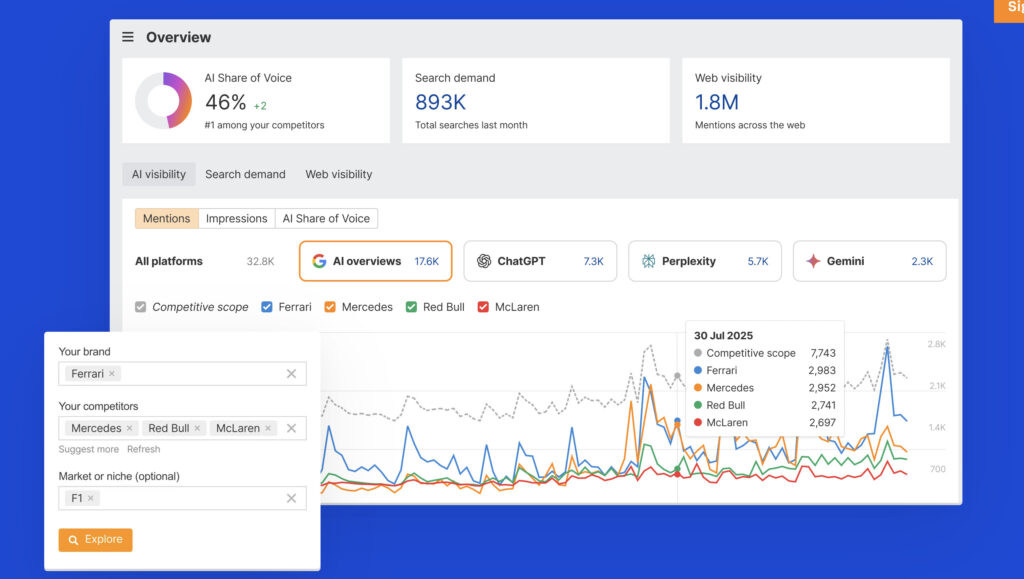
What I like
The Brand Radar tool, in fact, is a rich database powered by millions of prompts, showing real AI-generated answers where my brand (or my competitor’s) is mentioned. The ability to track unlinked mentions, benchmark sentiment, and cluster AI prompts into topic areas makes it easier to find new opportunities.
And because it all lives within Ahrefs, you can instantly connect those insights with backlink data, keyword rankings, and content performance.
What I dislike
Some of the most advanced AI features require a higher-tier plan, and even then, certain actions eat into credits quickly if you’re doing deep research.
Rank tracking on lower-tier plans isn’t as frequent as you’d like, which is a pain given how fast AI answers change. All in all, Ahrefs is amazing for SEO and AI visibility, no doubt, but you’ll feel the costs if you want to fully unlock it.
3. Profound
Profound positions itself as an enterprise-first leader in Generative Engine Optimization. It offers granular tracking, insights, and optimization tools.
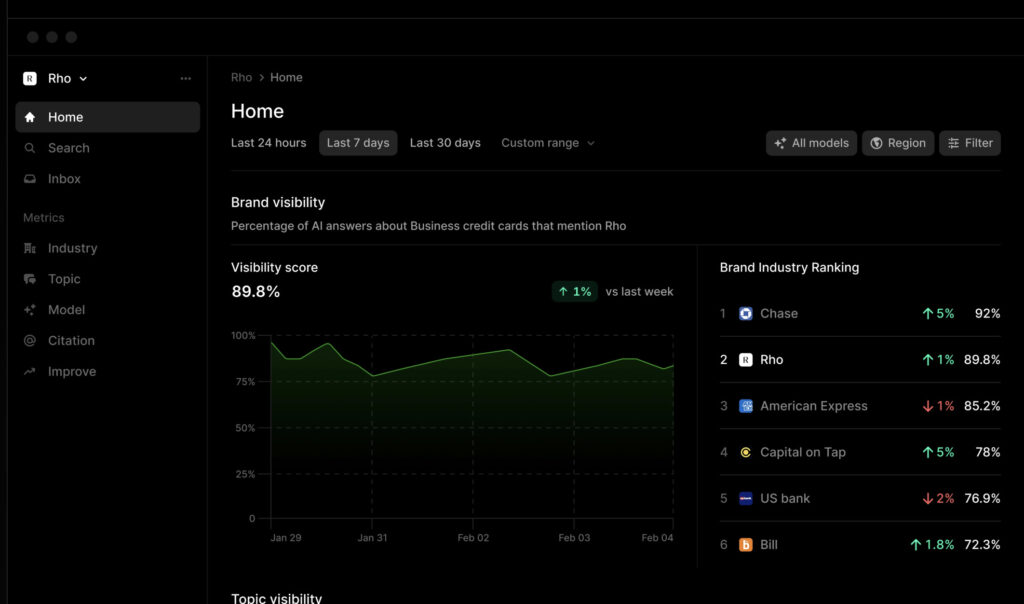
What I like
Profound will tell you your brand was mentioned and show how often, in what sentiment, and which sources AI relied on.
Features like Conversation Explorer make it easy to uncover what people are really asking AI about your industry, while AI crawler tracking helps understand how bots are interacting with your site. Even better, the Action Center gives recommendations on how to tweak content.
What I dislike
With plans starting at around $499 a month, Profound is clearly built for Fortune 500s, not smaller teams or solo marketers. There’s no free trial or lighter-tier option to experiment with.
And while it’s excellent at AI visibility, it doesn’t replace a broader SEO suite like Semrush or Ahrefs. You’ll still need those for backlinks, SERPs, and traditional keyword tracking. The depth is impressive, but the learning curve and cost can be intimidating if you’re not already resourced for it.
4. SE Ranking
SE Ranking’s AI Search Toolkit is a cost-effective way to monitor and optimize for generative search. The platform goes beyond traditional rank tracking by showing when your site is mentioned in AI snippets.

What I Like
What really stands out is that SE Ranking makes the AI search tracking approachable. It checks Google AI Overviews, ChatGPT, Perplexity, Gemini, and more.
The AI Overviews Tracker not only shows when your site is included in AI snippets but also reveals which competitors are appearing alongside you. You can see their domains, keyword triggers, and historical data trends, great for refining your SEO strategy.
The affordability is another good point. Compared to enterprise-level tools like Ahrefs or Semrush, SE Ranking gives you actionable AI insights at a fraction of the cost.
What I Dislike
SE Ranking’s AI Overview data is super helpful, but it isn’t always as deep as you’d like for enterprise-level projects. For example, the backlink database and competitive analysis features aren’t as extensive as those in Semrush or Ahrefs.
I’ve also seen occasional inconsistencies in rank tracking data – something that’s not unique to SE Ranking, but still worth noting.
5. Keyword.com
Keyword.com offers a dedicated AI Visibility Tracker. It covers Google’s AI Overviews, ChatGPT, Gemini, Perplexity, Claude, and even newer engines like DeepSeek and Mistral. For me, that focus makes it stand out.
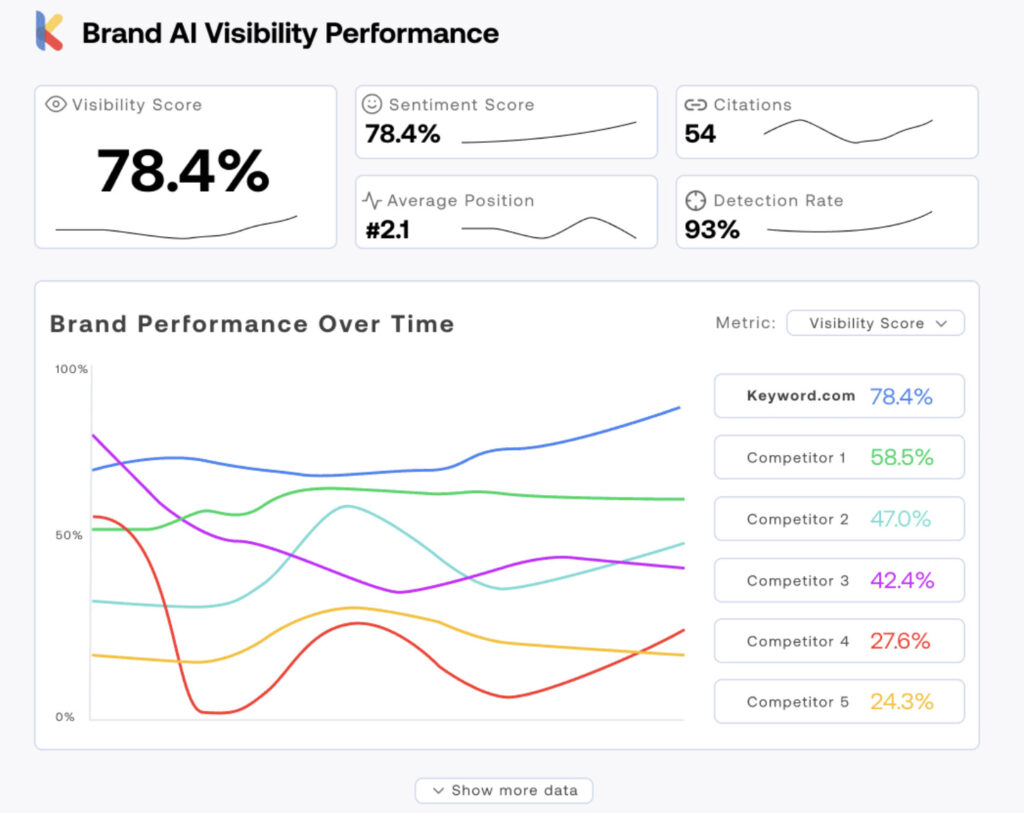
What I Like
Many of my connections say that Keyword.com stands out for its simplicity and usefulness. In my experience, yes, its interface is clean and easy to use. You can quickly see which of your keywords trigger AI Overviews.
I also appreciate the affordability. I only pay for the keywords and refresh frequency I need, which makes it easier to scale campaigns for clients without overspending.
On top of that, the sentiment analysis for AI mentions is surprisingly useful, letting me see not just if my brand shows up in AI answers, but whether it’s being portrayed in a positive or negative light.
What I Dislike
For me, Keyword.com is pretty limited outside of rank tracking. If you need keyword research, backlink analysis, or site audits, you have to use other tools alongside it. The AI Visibility Tracker also runs on a credit-based system. If you want to check too many keywords too often, you burn through credits fast.
Compared to platforms like Semrush, the reporting depth isn’t as advanced either, so you don’t always get the same level of detail for AI Overview analysis. It’s user-friendly, but a lot of its advanced features are geared more toward agencies than in-house SEO teams.
Conclusion
We haven’t been living with AI search long enough to see its full impact on search, but early signs show they’re already reshaping SEO in a big way. Visibility shifts quickly, informational content dominates, and the right tools make all the difference.
Expert opinion
Content is the reason search began in the first place.
Lee Odden
Frequently Asked Questions



